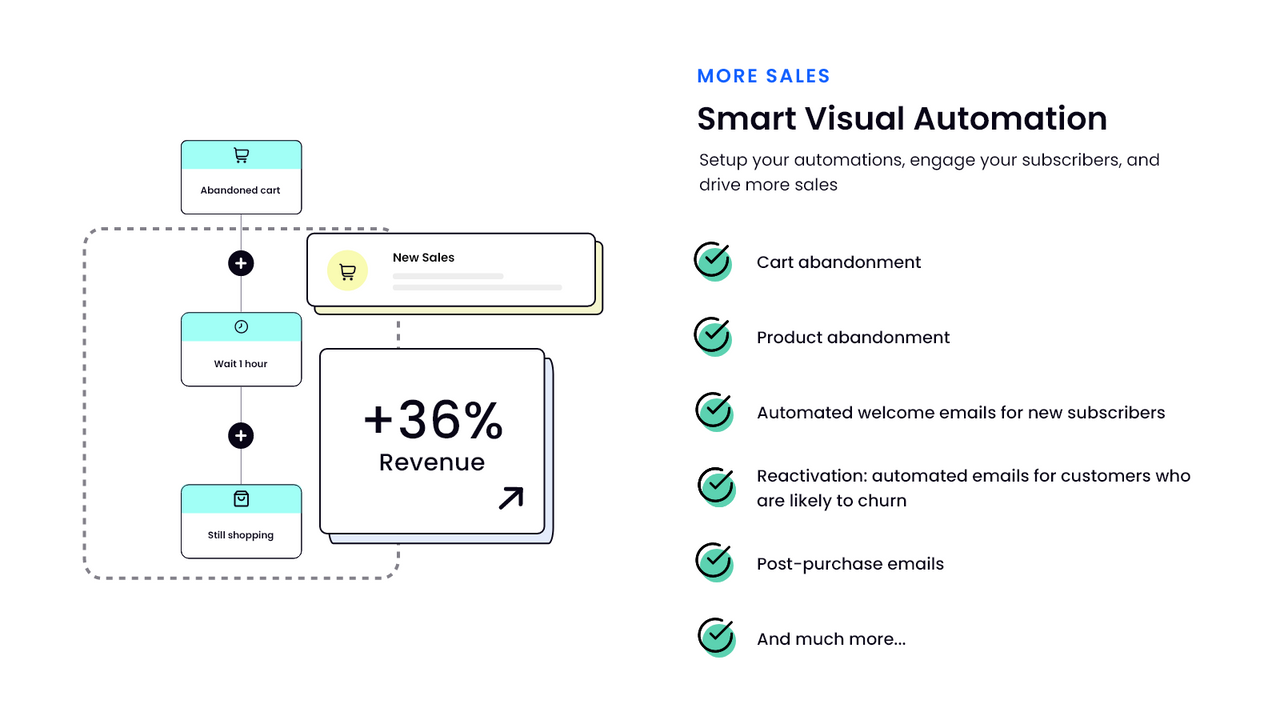In a world where competition continues to grow, automation becomes an essential asset for companies looking to optimize their sales and customer support. Shopify, as a leader in e-commerce solutions, is revolutionizing this dynamic by integrating powerful tools that facilitate the management of sales processes and improve the customer experience. With its innovative features, it enables businesses to gain efficiency while providing impeccable service, thus taking sales performance to a whole new level. Discover how Shopify positions itself as a pioneer in this transformation, redefining the standards of automation and propelling businesses towards a thriving future.
Table of Contents
ToggleThe Impact of Automation on Sales

Shopify is revolutionizing the e-commerce world by offering automation solutions that boost sales. The impact of this automation is felt across several key areas:
1. Simplification of Sales Processes
With tools like Shopify Flow, managing repetitive tasks becomes a breeze. Actions can be automated, allowing sales teams to focus on acquisition strategies rather than tedious manual tasks.
2. Real-Time Order Tracking
Automation enables seamless order tracking. Customers are instantly informed via automatic notifications through email or SMS. This enhances transparency and improves the user experience.
3. Improved Customer Relationships
Thanks to automation, customer support is accessible 24/7. Chatbots handle frequently asked questions, allowing for responsive service. This reduces wait times and increases customer satisfaction.
4. Reduction of Operational Costs
By delegating certain tasks to automated systems, companies achieve significant savings. This translates into optimized human resources and costs related to managing sales and customer support.
5. Sales Performance Analysis
The implementation of automated analytical tools allows real-time tracking of sales performance. This data is essential for adjusting strategies and maximizing conversions. Detailed reports inform about trends, popular products, and purchasing behaviors.
Automation is not limited to improving sales alone; it is a powerful lever to transform the customer experience, thus redefining the standards of customer support. By leveraging innovation, businesses see their processes becoming more agile and their customer service more effective.
Optimizing Sales Processes
Shopify is revolutionizing the sales world by integrating automation solutions that enhance both efficiency and customer experience. By optimizing sales processes, this platform allows businesses to save time while increasing their performance.
Sales management thus becomes smoother with smart tools that automate repetitive tasks. Here are some examples of optimization:
- Lead Tracking: Automation tools capture visitor information and process it instantly, making follow-up easier.
- Personalization of Offers: Through data analysis, it is possible to send targeted offers that increase the conversion rate.
- Inventory Management: Automatic alerts regarding stock levels help prevent shortages and optimize restocking.
By integrating efficient systems, Shopify helps businesses coordinate their sales tools more effectively. This not only reduces time spent on administrative tasks but also minimizes the risk of human errors.
Moreover, automation allows for real-time performance analysis. Data is collected and interpreted swiftly, providing valuable insights to adjust sales strategies. This enhances the ability to adapt to market trends and customer needs.
By adopting such an approach, businesses can also anticipate purchasing behaviors and improve their marketing strategy. The combination of these elements results in a presence in the market that is both effective and relevant.
Ultimately, integrating a tool like Shopify offers a true advantage for any business looking to optimize its sales while ensuring exceptional customer support. It is an approach that focuses on the synergy between humans and technology, thus guaranteeing an enriched experience for both customers and sales teams.
Enhancing User Experience
Shopify revolutionizes the e-commerce world by integrating automation solutions that optimize sales and customer support processes. With powerful tools, online stores can now offer a seamless customer experience while improving their operational efficiency.
The impact of automation on sales is immense. By automating repetitive tasks, sales teams can focus on higher-value activities. For example, using chatbots allows for instant answers to customer inquiries, even outside of business hours. This leads to an increase in conversions and enhanced customer satisfaction.
By improving the user experience, Shopify positions its merchants for success. Customers can easily find the information they need, make purchases, and benefit from frictionless support. Here are some key advantages of this approach:
- Instant responses to customer inquiries via automated systems.
- Real-time order tracking for better transparency.
- Personalized product suggestions based on purchasing behavior.
- Enhanced customer loyalty through proactive communication.
Implementing an effective automation strategy goes beyond simply integrating tools. It also requires regular performance monitoring to adjust processes based on customer feedback. The data collected can be leveraged through advanced analytics, enabling businesses to make informed decisions.
By integrating these technologies, Shopify merchants not only improve their efficiency but also create a culture of innovation, remaining responsive to market needs. Ultimately, this digital transformation shapes a future where every customer interaction is meaningful and every sale is optimized.
-
Integration of AI
Use of chatbots for 24/7 assistance.
-
Analytics Tools
Analysis of customer behaviors to personalize the experience.
-
Process Automation
Automated management of orders and returns.
-
Multichannel Integrations
A centralized platform to manage sales across different channels.
-
Proactive Support
Automatic notifications for order updates.
-
Personalization
Product recommendations based on purchase history.
-
Automated Support Forms
Reduced response time and better management of requests.
-
Performance Tracking
Real-time metrics to evaluate customer satisfaction.
Automation of Customer Support

Shopify reinvents customer support automation, transforming a task that often consumes time into a seamless and efficient service. With advanced features, businesses can now offer assistance around the clock, without interruptions.
The key to this transformation lies in the use of intelligent chatbots and ticketing systems. These tools allow for real-time management of customer requests while relieving staff from repetitive tasks.
Here are some notable advantages of automating customer support with Shopify:
- Instant Responses: Customers receive immediate answers to their frequently asked questions, thereby improving their overall experience.
- Volume Management: During peak demand times, bots can handle a significant number of interactions without delays.
- Personalization: Automation solutions can be configured to meet specific business needs, taking into account the brand’s voice.
Shopify also allows the integration of analytics tools, facilitating the understanding of customer behaviors. This allows for refining automatic responses and identifying areas that require special attention.
Integrations with external tools, such as messaging platforms, further simplify communication. Thus, whether on Facebook Messenger, WhatsApp, or via email, customer support can be accessible across various channels, enhancing customer engagement.
Finally, training teams remains essential. Shopify offers resources and training that enable teams to master these automation tools, making them more efficient and proactive.
Quick and Personalized Responses
Shopify has become an essential player for businesses looking to optimize their customer experience. One of the keys to this optimization lies in customer support automation, which allows for faster responses while maintaining a personalized approach.
With innovative tools, Shopify enables businesses to provide quick and personalized responses to common customer questions. This not only improves customer satisfaction but also frees up time for support teams, allowing them to focus on more complex cases.
Here are some ways Shopify facilitates customer support automation:
- Use of chatbots to provide instant 24/7 responses.
- Application of response scripts to handle frequently asked questions.
- Integration of Email Marketing tools for targeted communications.
Businesses can also personalize interactions by using analytics to understand their customers’ specific needs. This data-driven approach ensures that each interaction is relevant and engaging.
By optimizing workflows through customer relationship management (CRM) tools, businesses can offer exemplary service where each step is thoughtful and improved. This not only creates a smooth customer experience but also strengthens customer loyalty and retention in the long term.
Proactive Request Management
Shopify revolutionizes the online commerce interface by emphasizing an automation that goes beyond simple repetitive tasks. This approach transforms customer support into an exemplary service that meets user expectations while optimizing brand performance.
Customer support automation is essential for any business looking to maximize its efficiency. With sophisticated tools, Shopify enables the anticipation of consumer needs and the resolution of issues even before they are expressed.
Proactive request management is at the heart of this strategy. Here are some key methods that Shopify uses:
- Intelligent Chatbots: Available 24/7, these virtual assistants can instantly answer frequently asked questions, providing continuous support without requiring human intervention.
- Sentiment Analysis: Through advanced algorithms, Shopify assesses customer sentiments via their interactions, allowing for appropriate and personalized responses.
- Comprehensive Knowledge Base: By centralizing information, customers can access a wealth of resources to find answers to their questions without needing additional assistance.
Adopting these automation solutions helps reduce operational costs while improving customer satisfaction. Users thus benefit from a much smoother and responsive journey.
By relying on tracking and analysis tools, Shopify also offers the possibility of measuring customer support performance. Adjustments based on accurate data lead to a true personalization of the user experience, allowing for more effective customer engagement.
With Shopify, customer support automation is no longer an option but a necessity to remain competitive. Adopting these innovative practices is a step towards operational excellence, ensuring optimal customer loyalty and satisfaction.
Integration of Automation Tools
Découvrez les différences clés entre l'automatisation des workflows et l'automatisation robotisée des processus !
— Zoho France (@ZohoFrance) June 13, 2024
Apprenez comment ces technologies peuvent transformer vos opérations quotidiennes et maximiser votre efficacité.💡 https://t.co/St4ERdZ35F #ZohoCreator pic.twitter.com/uDTnQ0iu7F
Shopify has distinguished itself by integrating automation tools that facilitate not only sales but also customer support. With advanced features, users can optimize their business for exemplary service. Automation allows for the elimination of repetitive tasks, making room for more strategic and creative actions.
This platform offers a multitude of tools to automate various aspects of business management. Here are some examples:
- Email Automation: By scheduling email marketing campaigns, you can engage your customers without having to manually send each message.
- Inventory Management: Automatic alerts notify you when products are out of stock, thus avoiding sales losses.
- 24/7 Customer Support: Integration of chatbots to manage customer inquiries even outside business hours.
Integrations with tools like Zapier enable a seamless interaction between Shopify and other applications you already use. For example, you can create a workflow that automatically synchronizes orders received on Shopify with your customer relationship management (CRM) system.
Furthermore, analyzing marketing performance becomes more accessible through automated reports. This data helps understand what works and what needs improvement, allowing adjustments to strategies in real time.
By implementing these tools, businesses can not only save time but also provide more effective and responsive customer support. This leads to an increased customer satisfaction and, consequently, improved loyalty.
Third-Party Apps and Plugins
Shopify stands out by effectively integrating automation tools that transform the landscape of sales and customer support. With its intuitive platform, businesses can easily adopt solutions that significantly simplify their daily operations.
The third-party apps and plugins available on Shopify play a major role in this automation. They allow users to optimize various aspects of their business, from order management to customer data analysis.
- Zapier: Connects Shopify with other applications without any coding skills, streamlining processes.
- Zendesk: Facilitates quick responses to customer inquiries, turning customer support into a true asset.
- Mailchimp: Automates email marketing campaigns, enhancing customer engagement without additional effort.
The integration of these tools allows for a more coherent and efficient management of marketing campaigns and customer service. Users can set up automated workflows that streamline repetitive tasks, resulting in significant time savings.
With integrated AI tools, Shopify helps businesses analyze marketing performance and adjust their strategies in real time. Adopting these advanced technologies ensures a better customer experience while increasing sales.
Finally, the community around Shopify is extensive, offering many training resources to help users get the most out of these automation tools. Whether you are a novice or an expert, there are solutions tailored to every need.
Data Analysis for Informed Decisions
Shopify revolutionizes how businesses manage their sales and customer support through the integration of automation tools. This platform allows users to create custom solutions that simplify every aspect of their business, both in terms of sales and customer service. One of the main benefits lies in the ability to connect various tools that work together seamlessly.
Among the available integrations are tools like Zapier, which enable linking Shopify to other applications without needing to code. This simplifies workflows and allows teams to focus on higher-value tasks. By automating processes such as email sending, inventory management, or data synchronization between different platforms, businesses can save valuable time.
Data analysis for informed decisions is another fundamental aspect of the automation offered by Shopify. Every sale, interaction, and customer feedback generates an incredible amount of data. By leveraging this information through integrated analytical tools, businesses can better understand their customers’ behavior and adjust their strategies accordingly.
- Product Performance Tracking: Knowing which products sell best can guide inventory and marketing strategies.
- Understanding Purchasing Behaviors: Analyzing buying habits helps personalize offers and improve customer experience.
- Optimizing Marketing Campaigns: By assessing campaign effectiveness, it is possible to adjust messages for better impact.
This analysis also provides a platform for testing different strategies, allowing for continuous innovation in the business approach. With a vision based on reliable data, businesses can not only react quickly to market trends but also anticipate their customers’ needs.
“`











